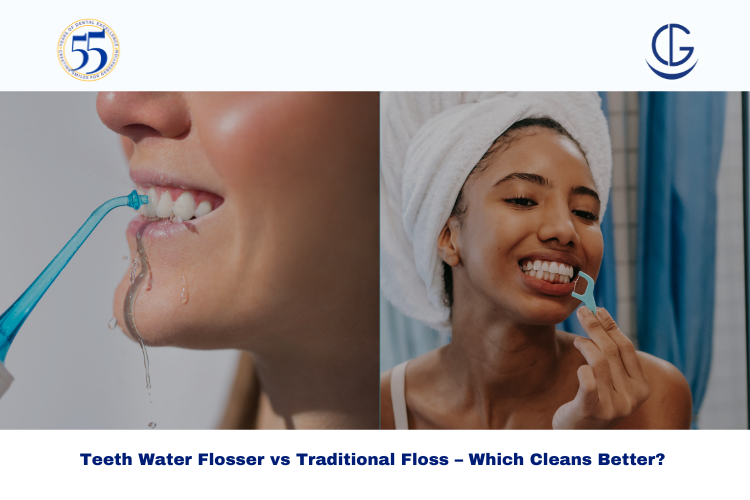Schedule Appointment



When it comes to maintaining a healthy smile, proper cleaning between teeth is just as important as brushing. One of the most common questions patients ask at Dr Gowds Dental Hospital in Hyderabad is whether a Teeth Water Flosser is better than traditional floss. With modern dental technology evolving, understanding the difference between the two methods can help you make the right choice for your oral health.
If you’re searching for the best dentist in Hyderabad, Prof. Dr. M.S. Gowd, and his team of specialists emphasize that effective flossing—whether manual or powered—plays a key role in preventing gum disease and cavities.
A Teeth Water Flosser is a modern dental cleaning device that uses a steady stream of pulsating water to remove food particles, plaque, and bacteria between your teeth and below the gumline. It’s an excellent alternative for those who find traditional flossing difficult or uncomfortable.
Traditional floss—made of nylon or Teflon string—is the time-tested method of cleaning between teeth. It manually removes plaque and debris by scraping against the sides of teeth.
However, some users find traditional flossing challenging, especially around crowded teeth or orthodontic devices.
| Feature | Teeth Water Flosser | Traditional Floss |
| Ease of Use | Very easy, ideal for all ages | Requires technique and dexterity |
| Effectiveness | Excellent for gum health and deep cleaning | Excellent for plaque removal on tooth surfaces |
| Comfort | Gentle and soothing | Can cause discomfort or bleeding if done harshly |
| Suitability | Great for braces, bridges, implants | Ideal for natural teeth |
| Cost | Higher upfront cost | Very affordable |
The right choice depends on your individual dental needs:
Always consult a professional at a reputed dental hospital in Hyderabad before making changes to your oral hygiene routine.
Even with perfect flossing habits, regular dental checkups are essential. Professional cleaning removes tartar buildup that neither a toothbrush nor a flosser can handle.
The team at Dr Gowds Dental Hospital uses advanced diagnostic tools and personalized treatment plans to help patients maintain long-term oral health. If you experience persistent bleeding gums, bad breath, or tooth sensitivity, book a consultation with Prof. Dr. M.S. Gowd for expert advice.
Both Teeth Water Flosser and traditional floss play vital roles in maintaining oral hygiene. The best approach is to combine them for comprehensive cleaning. Remember—techniques matter more than tools.
If you live in Hyderabad and want expert guidance on choosing the right flossing method, visit Dr Gowds Dental Hospital, where Prof. Dr. M.S. Gowd and his team provide world-class dental care with a personal touch.
A Teeth Water Flosser can remove debris more efficiently from hard-to-reach areas, especially under the gumline or around braces. However, traditional floss is still best for scraping plaque off tooth surfaces. Using both provides the most complete clean.
While a Teeth Water Flosser is highly effective, dentists often recommend combining both. The water flosser cleans areas traditional floss can’t reach, while regular floss removes sticky plaque buildup.
For best results, use your Teeth Water Flosser once a day, preferably after brushing. Consistency helps prevent gum inflammation and plaque buildup.
Yes! It’s one of the safest and most effective tools for people with orthodontic appliances, bridges, or dental implants. It helps remove food particles that traditional floss may miss.